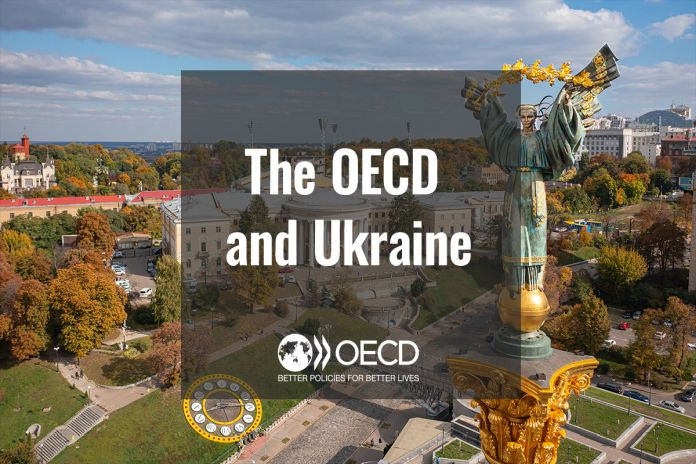PARIS, France, (OECD) – The Organisation for Economic Co-operation and Development (OECD) and the government of Ukraine today launched a four-year Country Programme that will support Ukraine’s agenda for reform, recovery and reconstruction and will help Ukraine advance its ambitions to join the OECD and the European Union.
The Programme was signed in Paris at the OECD’s Meeting of the Council at Ministerial Level (MCM) by OECD secretary-general Mathias Cormann and in Kyiv by prime minister Denys Shmyhal, who joined the MCM online.
“Since our last MCM, the OECD has continued to further deepen and strengthen our co-operation with Ukraine. We have expanded our work in support of Ukraine’s reform agenda, provided inputs to the country’s National Recovery and Development Plan and have worked closely with international partners to co-ordinate our support,” OECD secretary-general Mathias Cormann said.
“The Country Programme we have signed today has been developed in close co-operation with and reflects the priorities of, the government of Ukraine with its focus on stronger institutions and governance, continuing the fight against corruption, attracting private sector investment, and laying the foundations for long-term well-being and opportunities for its people. It will help bring Ukraine closer to OECD standards and good policy practices and ultimately also support Ukraine’s accession to the EU. The implementation of the Ukraine Country Program will be coordinated on the ground in Kyiv by our dedicated team in our OECD-Ukraine liaison office, opened earlier this year and headed by Dr Rosaria Puglisi.”
“The launch of the OECD Country Programme for Ukraine is a milestone in our longstanding co-operation and a commitment to our mutual work in line with our shared values of democracy, rule of law and open market economy,” Prime minister Denys Shmyhal said. “We welcome this collective support from OECD members and stand ready to support its implementation to demonstrate our commitment to policy reform in line with international best practices.”
The OECD Council condemned Russia’s war of aggression within hours of the invasion, expressing its strong solidarity and support for Ukraine.
Since then, the OECD has continued, to the extent that wartime conditions allow, to work with Ukraine in a wide range of policy domains, including anti-corruption, tax and public administration reform. It has also helped member states address the needs of Ukrainian refugees and supported educational continuity and access to labour-market opportunities for those displaced by the war. In addition to sustaining and developing its bilateral work with Ukraine, the Organisation actively participates in the co-ordination of international support for Ukraine with Ukraine’s other bilateral and multilateral partners.
In October 2022, the OECD Council recognised Ukraine as a prospective Member of the Organisation and opened an initial accession dialogue, following a request from the Government. The Organisation established a new dedicated OECD-Ukraine liaison office, initially from Paris, and which started operating from its premises hosted by the Embassy of the Slovak Republic to Ukraine in Kyiv on 1 March 2023.
The OECD Council has invited Ukraine to undertake a Country Programme to further structure its dialogue with the OECD. The Country Programme is an established OECD tool that enables Partner economies to leverage OECD expertise and best practices, strengthen institutions, and build capacity for successful policy reforms. This support will be vital to helping Ukraine during the war and to ensuring that reconstruction aid is used to the best effect to promote economic development and citizens’ welfare.
The Programme is focused on Ukraine’s reconstruction and recovery priorities, while also supporting its OECD and EU accession goals. It addresses such critical long-term structural issues as tax policy and administration, corporate governance, public governance, integrity and anti-corruption, competition and environmental policy. It also encompasses key reconstruction challenges such as infrastructure policy and support for displaced persons and returning refugees. The Programme builds on past OECD work on Ukraine’s energy and agriculture sectors. It will be implemented in close consultation with other international partners, in particular via the Multi-Agency Donor Co-ordination Platform led by Ukraine, the EU and the United States, in which the OECD participates.
Altogether, the Ukraine Country Programme consists of 31 policy reviews and capacity-building projects, and it envisages upgrading Ukraine’s participation in 24 OECD bodies, as well as adherence to more than 70 OECD legal instruments over four years.





